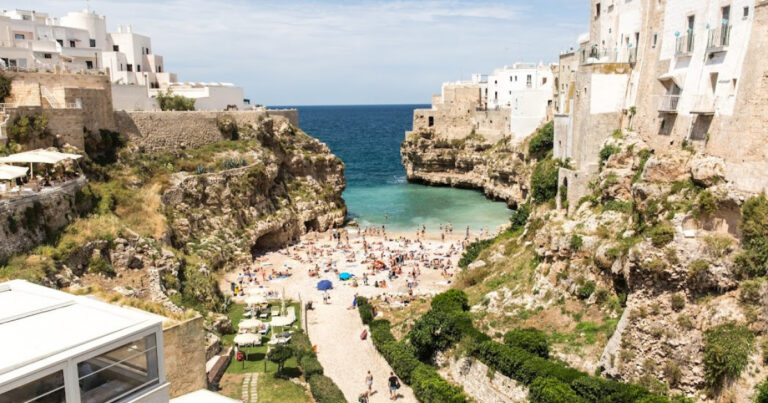
Travel inspired by some of Eurovision’s most iconic pop anthems.
Eurovision has given us some great songs, from the upbeat melody of Waterloo by an undiscovered ABBA in 1974 to electropop, power ballads and the contest’s first-ever heavy metal winner in 2006. To mark the latest edition of Europe’s most joyous musical celebration, we rounded up a few of Eurovision’s most iconic songs and the hometowns of the stars that performed them. Book a trip to one of these destinations to embark on an unforgettable Eurovision pilgrimage.
Waterloo, Abba – Sweden

Sweden has had a few iconic Eurovision wins, from Loreen taking top place in the 2012 contest in Baku with her hit ‘Euphoria’, to ABBA skyrocketing into the spotlight in 1974. The latter remains the greatest success story to come out of Eurovision; launched into international fame at the Brighton contest in the early seventies with the now-classic pop anthem, Waterloo, ABBA went on to become one of the best-selling bands in music history, selling 150 million records worldwide.Visit the Swedish hometowns of three of the ABBA band members (Anni-Frid was actually born in Norway) – staying at At Six in Stockholm, Hotel Royal in Gothenburg, and Clarion Collection Hotel Victoria in Jönköping.
Think About Things, Daði Freyr – Iceland

Though Eurovision was cancelled in 2020, this song was a fan favourite. A synthy dance tune dreamt up by Icelandic singer Daði Freyr and his band Gagnamagnið, Think About Things became a viral hit and received support from celebrities and Eurovision commentators alike. While the song had been selected to represent Iceland in Rotterdam in 2020, tragically the contest was called off. Check out the retro video complete with catchy dance routine, if you haven’t already. The group is originally from Iceland’s capital city Reykjavík, famous for its thriving nightlife and music scene. Stay at Freyja Guesthouse & Suites, a guesthouse in Reykjavík.
Lipstick, Jedward – Ireland

Ireland holds the record for the most Eurovision wins; an impressive seven times since this musical nation’s very first entry in 1965. And while the Emerald Isle’s 2011 entrant may not have taken home top prize – identical twin brother duo, Jedward, scored eighth place – it still proved to be a memorable year for Ireland. Whether it’s for the extreme quiff hairstyles, their electropop banger Lipstick, or for being described by Simon Cowell when they appeared on the X-Factor in 2009 as ‘two of the most irritating people we’ve had on here in a long, long time’, Jedward has amassed something of a cult following. And proved to be one of the most successful acts to come out of Eurovision. Jedward hails from Dublin, a city cherished for its musical heritage and live music scene; visit the band’s hometown yourself and stay right in the centre at Moxy Dublin City.
Hard Rock Hallelujah, Lordi – Finland

Representing Finland at the Athens Eurovision in 2006, hard rock/heavy metal band Lordi became the first entry of its genre to ever win first place at Eurovision. The song? Hard Rock Hallelujah, a track that later went on to break more records for the most people singing karaoke simultaneously, when it was belted out by a crowd of 80000 in Helsinki’s Market Square. 2006 was also Finland’s first ever Eurovision victory, making this particular anthem even more symbolic. The band originates from Rovaniemi, the capital of Lapland and a city known both as the home of Father Christmas as well as for viewing the Northern Lights; stay at Tuomas´ luxurious suites, Nouka.
Rise Like A Phoenix, Conchita Wurst – Austria

In 2014, Austrian singer and drag queen Conchita Wurst (alter ego of artist Thomas Neuwirth) graced the Eurovision stage with her power ballad, Rise Like A Phoenix. Wowing the crowd with her glamorous, long-haired, bearded lady persona, she swept first prize and became an instant sensation. But her career has continued to blossom after the contest, with more music, modelling, activism, public appearances and even an autobiography; head to Gmunden – the Austrian town where Conchita grew up – staying at Renaissance Apartment Marktplatz.
Nel blu dipinto di blu, Domenico Modugno – Italy

In 1958, A Eurovision classic was born with the entry of Domenico Modugno’s Nel Blu Dipinto Di Blu, which literally translates to ‘In the Blue-Painted Blue’ (though the song actually became better known as Volare, meaning To Fly). Modugno didn’t manage to snag first place (he was voted third) but the song has become a Eurovision anthem over the years, captivating audiences with its poetic lyrics. It was written by lyricist Franco Migliacci with Domenico Modugno and was inspired by Miglacci’s memories of two hypnotic paintings by modernist artist, Marc Chagall. Head to Modugno’s hometown of Polignano a Mare, an idyllic seaside town in Apulia for a night or two at charming B&B, Torres Suite.